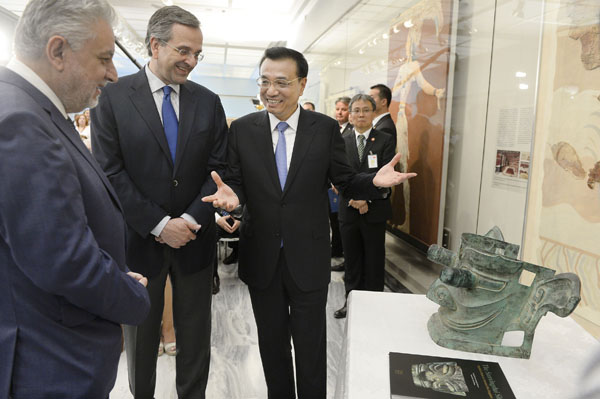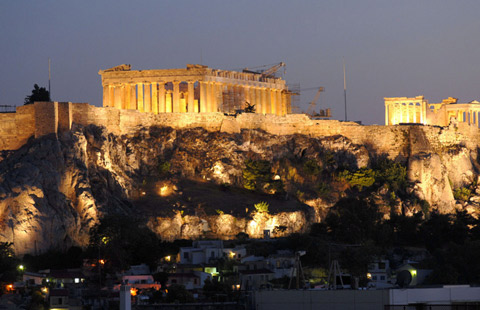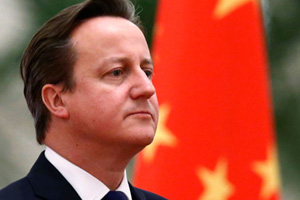
Li makes cultural visits in Greece
Comments Print Mail Large Medium Small
Trips to historical sites show leaders hope to extend ties beyond deals
In a light moment at the end of his European visit, Premier Li Keqiang on Saturday toured two famous sites in Greece — the Palace of Knossos and the Iraklion Archaeological Museum.
It was a rare arrangement, considering leaders' overseas trips are generally organized around tight, pragmatic schedules.
The premier also visited the Acropolis of Athens and the National Archaeological Museum on Friday, and had dinner at the Acropolis Museum on Thursday.
Analysts said such arrangements are for paying tribute to another great civilization.
It also shows that, after decades of rapid growth, Chinese leaders' overseas visits no longer focus solely on practical results, such as forging deals. They also make time for spiritual and cultural understanding.
"Greece is a country that's home to a great civilization and a long history — a mirror of China in the West," China Institute of International Studies vice-president Ruan Zongze said.
He said comparable histories enable the two nations to share similar understandings of such issues as when interests clash with justice.
"We are comfortable dealing with countries like that," Ruan said.
Ruan added spiritual exchanges can help other nations better understand Chinese culture's core and, consequently, why China does not have "genes of expansion", as the premier said during his visit.
Greek Prime Minister Antonis Samaras, who accompanied Li throughout the visit, said on Friday Li is a friend and they can "look into each other's eyes" because of the trust between the two leaders and nations.
China has given strong support to Greece during the European country's debt crisis and declared confidence in its economy, while providing funding through various mechanisms.
Greece, in turn, used its great maritime prowess to help Beijing evacuate more than 13,000 citizens from Libya in just 10 days in 2011. It opened the island of Crete for Chinese to stay temporarily.
"(Greece) gave almost anything it could," Ruan said.
Cui Hongjian, director of the China Institute of International Studies' Department of European Studies, said Sino-Hellenic relations "have a good foundation" and enjoy an "almost perfect situation".
"We share a rich accumulation of history, deep sentiments toward each other and huge cooperation potential," Cui said.
Cui said China has accumulated wealth in recent decades, and its desire for spiritual exchanges with the outside is surging.
"I actually think it is a better way to communicate with other nations, especially with Europe," he said.
"If our exchanges can reach such a high level, many of our specific problems with Europe will disappear."
Li left Greece for home on Saturday evening. The trip also took him to Britain.
Contact the writers at xingzhigang@chinadaily.com.cn and lixiaokun@chinadaily.com.cn





